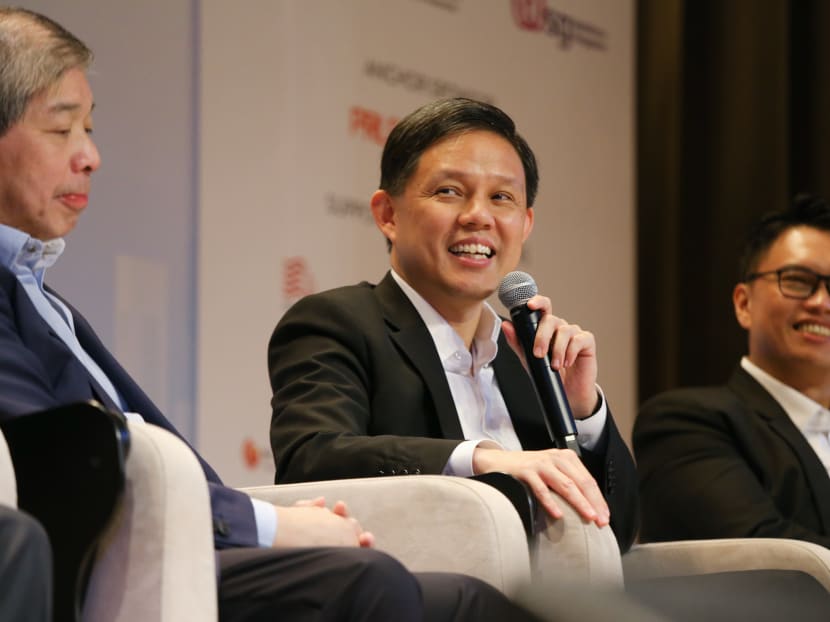Future public sector leaders will need more than just policy-making skills: Chan Chun Sing
SINGAPORE — The public service will need leaders that have skills beyond just policy-making and there are plans afoot to look for such talents, said Minister-in-charge of the Public Service Chan Chun Sing in Parliament on Thursday (Feb 28).

Educational qualifications remain a valid proxy of certain skills and capabilities, and the Public Service Division will not disregard this, said Minister-in-charge of the Public Service Chan Chun Sing.
SINGAPORE — The public service will need leaders that have skills beyond just policy-making and there are plans afoot to look for such talents, said Minister-in-charge of the Public Service Chan Chun Sing in Parliament on Thursday (Feb 28).
Mr Chan said he agreed with several MPs who spoke on the need to create a more diverse public service leadership, during his speech in the Committee of Supply debate on the Prime Minister's Office (PMO).
As such, when the public service selects future leadership teams, it will “increasingly look for a combination of operations, communications, mobilisation and international exposure” beyond pure policy-making skills, Mr Chan, who is also Trade and Industry Minister, said.
“We need a public service leadership team that has different talents and is able to surface different perspective,” he said. “A more diverse public service is a more resilient public service for the uncertainties ahead.”
Educational qualifications remain a valid proxy of certain skills and capabilities, and the Public Service Division will not disregard this. However, it will also look out for other skills, competencies and traits when recruiting, he said.
“Beyond intellect, we also want officers who have initiative and creative ideas, and those who have strong inter-personal skills and work well with others,” Mr Chan said.
At a recent conference organised by the Behavioural Sciences Institute of the Singapore Management University, panellists had said that the Singapore Government pays too much attention to academic qualifications in the way it chooses its leaders and assesses the ability of civil servants.
These panellists, who included the president of liberal arts college Yale-NUS Professor Tan Tai Yong, chairman of philanthropic organisation Lien Foundation Laurence Lien and consultant orthopaedic and hand surgeon Kanwaljit Soin, said that while academic grades could be a good indicator of diligence, structured thinking and conformity, the grades do not determine how leaders are chosen in other practical situations or segments of society.
The minister also shared how efforts are being made to help public officers approach their work with new mindsets and give them new skills so they can serve citizens better.
One aspect is for public officers to “think differently”. They must be able to see beyond the current task they are doing and work with their colleagues in other ministries or agencies to serve citizens better, he said.
The Public Service Division (PSD) will expand the system of job postings to apply to a wider group of officers, so they will gain wider perspectives and grow a stronger instinct to work across agencies and with the private and people sectors, Mr Chan said.
Public officers will not only need to develop good policies but to execute them well, he added. To do so, they must understand the needs of citizens and businesses better, know what are the constraints and challenges on the ground in implementing policies and see them through.
A new initiative, called Public Service Cares, will be introduced this year to encourage all officers to volunteer and serve the community. This will help them learn how to better communicate with citizens, and develop a culture to walk and know the ground needs better, he said.
To help public officers understand the region better and develop stronger ties with peers here, they must be plugged into various international networks and understand the economic, political and social systems of countries, Mr Chan said.
The Government will continue to encourage both Public Service Commission scholars as well as mid-career officers to be trained in different countries, and create more opportunities for officials across different countries to come together in joint courses, forums and discussions to share best practices and network.
The public service is also aiming for 100 per cent digital literacy, as officers can use technology to make the organisation better and more productive, he added.
WHY INDISCRIMINATE SACKINGS NOT THE WAY TO GO
Mr Chan also pointed out that while the public sector plans ahead, sometimes things do not go as planned or mistakes are made. Some recent ones include the leak of the HIV Registry, SingHealth cyberattack and army training deaths.
He said when these happen, the public service will work hard to fix the mistakes and seek to do better. The head of Civil Service recently reminded all senior public leaders to use the recent incidents and lapses as an important learning moment — a call Mr Chan said he supported.
“However, integrity means that we need to take responsibility and be accountable at every level for what went wrong,” the minister said.
“If we do not address the mistake head-on at the respective levels, but instead choose to indiscriminately sack staff and leaders every time something went wrong, then we will have a weaker system over time.”
He added that this will discourage the public service from trying new things to prevent making mistakes.
“That will be the biggest mistake and disservice to our nation,” Mr Chan said. CHANNEL NEWSASIA
For more stories like this, visit www.channelnewsasia.com.






